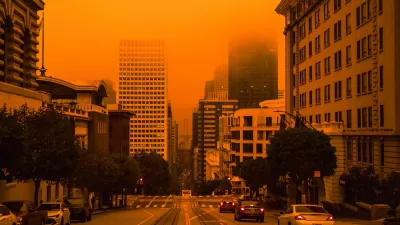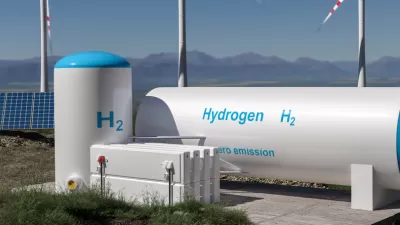Sick of reading about all the work that must be done to slow and mitigate the impact of global warming? A growing number of scientists are investigating how to "make climate change work for us."
Guy Gugliotta looks at the work of scientists studying how hotter temps and higher concentrations of carbon dioxide in the atmosphere could be a boon to plant growth, and in turn, feed a growing planet. They're focusing their research on cities, "which have conditions that can mimic what life may be like in the temperate zone of a heated planet."
“'There is a lot of emphasis on the mitigation of global warming, and we need that,' said Lewis H. Ziska, a plant physiologist for the Department of Agriculture, who is one of a growing number of scientists studying how plants react to elevated levels of greenhouse gases and other pollutants. At the same time, he added, 'we need to think about the tools we have at hand, and how we can use them to make climate change work for us.'”
"The effects of higher, mostly urban emissions are what prompted Dr. Ziska to reappraise global warming as a potential benefit to humanity. In an essay last summer in the journal Proceedings of the Royal Society B, Dr. Ziska and a group of colleagues from across the world argued that an expected increase in world population to 9 billion people from 7 billion by 2050 necessitated a “green revolution” to enhance yields of basic grains. Carbon dioxide, the group suggested, could be the answer.
“I try to avoid words like ‘good,’ ‘bad,’ ‘detrimental’ or ‘beneficial,’ ” said Kevin L. Griffin, an ecophysiologist at Columbia University who participated in a study about the 'heat island effect' on the red oak trees in New York."
FULL STORY: Looking to Cities, in Search of Global Warming’s Silver Lining

Alabama: Trump Terminates Settlements for Black Communities Harmed By Raw Sewage
Trump deemed the landmark civil rights agreement “illegal DEI and environmental justice policy.”

Study: Maui’s Plan to Convert Vacation Rentals to Long-Term Housing Could Cause Nearly $1 Billion Economic Loss
The plan would reduce visitor accommodation by 25% resulting in 1,900 jobs lost.

Planetizen Federal Action Tracker
A weekly monitor of how Trump’s orders and actions are impacting planners and planning in America.

Wind Energy on the Rise Despite Federal Policy Reversal
The Trump administration is revoking federal support for renewable energy, but demand for new projects continues unabated.

Passengers Flock to Caltrain After Electrification
The new electric trains are running faster and more reliably, leading to strong ridership growth on the Bay Area rail system.

Texas Churches Rally Behind ‘Yes in God’s Back Yard’ Legislation
Religious leaders want the state to reduce zoning regulations to streamline leasing church-owned land to housing developers.
Urban Design for Planners 1: Software Tools
This six-course series explores essential urban design concepts using open source software and equips planners with the tools they need to participate fully in the urban design process.
Planning for Universal Design
Learn the tools for implementing Universal Design in planning regulations.
Caltrans
Smith Gee Studio
Institute for Housing and Urban Development Studies (IHS)
City of Grandview
Harvard GSD Executive Education
Toledo-Lucas County Plan Commissions
Salt Lake City
NYU Wagner Graduate School of Public Service




























